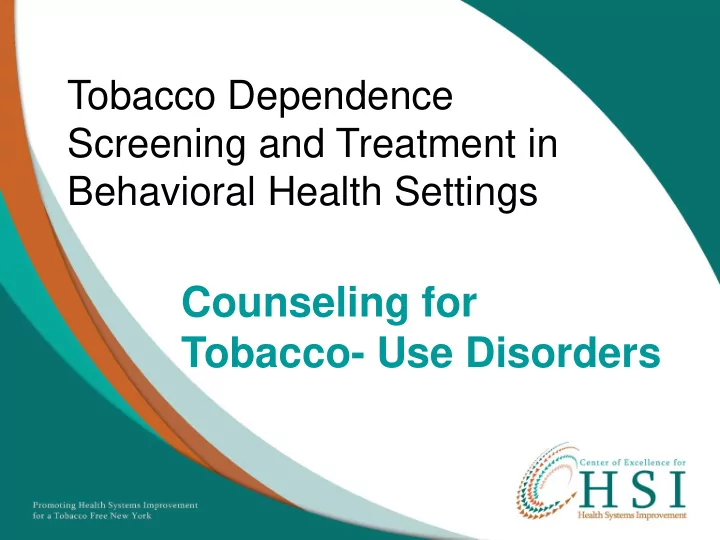

Tobacco Dependence Screening and Treatment in Behavioral Health Settings Counseling for Tobacco- Use Disorders
OBJECTIVES As a result of this training, participants will be able to: • Develop and understanding of why counseling services related to tobacco use should be provided to individuals in behavioral health treatment • Describe how a client’s stage of change with regard to tobacco use will impact the treatment strategies that a counselor employs in treating tobacco • Identify the basic skills of motivational interviewing and apply them to the treatment of tobacco use • Develop the knowledge, skills and abilities necessary to develop a tobacco quit plan • Identify relapse prevention strategies and apply them to the treatment of tobacco use 2
AGENDA • Welcome, Introductions, Goal and Objectives • Counselors Role in the Integration of Tobacco Use Disorder Treatment into Behavioral Health Settings • Trans Theoretical Model (TTM) and Counseling Strategies • Counseling Skills Practice: Strategies for Engaging Clients in Pre-contemplation and Contemplation • Creating a Quit Plan and Preventing Relapse: Providing Services to Clients in Preparation, Action and Maintenance • Case Studies: Putting It All Together • Closing 3
WELCOME & INTRODUCTIONS Please share your: • Name • Agency • Role 4
C OUNSELORS ’ R OLE IN THE I NTEGRATION OF T OBACCO USE D ISORDER T REATMENT I NTO B EHAVIORAL HEALTH S ETTINGS 5
Chronic Relapsing Illness • Treat as a chronic relapsing illness • Few people quit successfully without treatment • To maximize success, combine pharmacotherapy and counseling • Treat for as long as it takes • Treat to target-no withdrawal symptoms 6
BEHAVIORAL HEALTH PROVIDERS • Already have the required skill set to help clients with their tobacco use – Problem-solving – Coping with difficult situations/emotions – Avoiding high risk situations What you fail to say sends a message 7
O VERVIEW OF T RANSTHEORETICAL M ODEL : A SSESSING T OBACCO D EPENDENCE AND C LIENTS ’ R EADINESS & M OTIVATION TO Q UIT 8
O VERVIEW OF T RANSTHEORETICAL M ODEL (TTM): • A SSESSING T OBACCO D EPENDENCE & C LIENTS R EADINESS AND M OTIVATION TO Q UIT 9
STAGES OF CHANGE MODEL • Developed by Prochaska and DiClemente • Behavior change does not happen in one step, but in stages • An individual progresses through the stages at their own pace, depending on their goals and sources of motivation 10
THE STAGES OF CHANGE 11
PRECONTEMPLATION There is no intention to change behavior in the foreseeable future: • Others are aware of problem • Unaware or under-aware • Change due to outside pressure • No plans to change (6 months) • Coerced by others to change 12
CONTEMPLATION Aware that a problem exists and begins to think about overcoming it: • No commitment • Struggles with loss • Decisional-balancing • Can get stuck and remain so 13
PREPARATION Making Plans for the intended change: • Intending to take action within 30 days • Taking steps/making plans • May/may not have taken unsuccessful action in past year 14
ACTION Modification of behavior, experiences, or environment in order to overcome problem behavior • T aking an action is not being in action • Runs from one day to six months • Requires Considerable Commitment 15
MAINTENANCE Integrated the new behavior into present lifestyle • More than six months • Stabilizing change • Avoiding relapse • Can last a lifetime 16
THE STAGES OF CHANGE 17
19
Intervention based on the Stages of Change • Pre-contemplation - Motivational Interviewing • Contemplation – Motivational Interviewing • Preparation – Motivational Interviewing • Action – Cognitive Behavioral Therapy • Maintenance – Cognitive Behavioral Therapy 20
C OUNSELING S KILLS P RACTICE O PEN - ENDED Q UESTIONS AND A FFIRMATIONS 21
MOTIVATIONAL INTERVIEWING • Developed by Miller and Rollnick • Person-centered approach • Utilized in multiple settings • Most effective working with individuals in pre-contemplation and contemplation 22
O. A. R. S. • Open-ended Questions • Affirmations • Reflective Listening • Summarizing 23
OPEN-ENDED QUESTION STEMS • How… • What… • Tell me… • In what ways… 24
O PEN -E NDED Q UESTIONS A CTIVITY 25
AFFIRMATIONS • Statement of understanding and appreciation for something someone has tried, done, or achieved • Genuine and honest • Positive • Encouraging 26
AFFIRMATIONS • Make someone feel good and recognized • Recognize efforts, experiences, and feelings; this can include intent • Build rapport 27
A FFIRMATIONS A CTIVITY 28
C REATING Q UIT P LANS AND R ELAPSE P REVENTION P LANS P REPARATION , A CTION AND M AINTENANCE 29
QUIT PLAN • Set a quit date • Putting support systems in place • Review reasons for quitting • Discuss previous quit attempts • Plan for managing trigger 30
Tobacco Use Triggers • Internal Triggers • External Triggers • High Risk Situations 31
DEALING WITH TRIGGERS • Coping Strategies • Social Support 32
T HANK Y OU ! 33
Recommend
More recommend